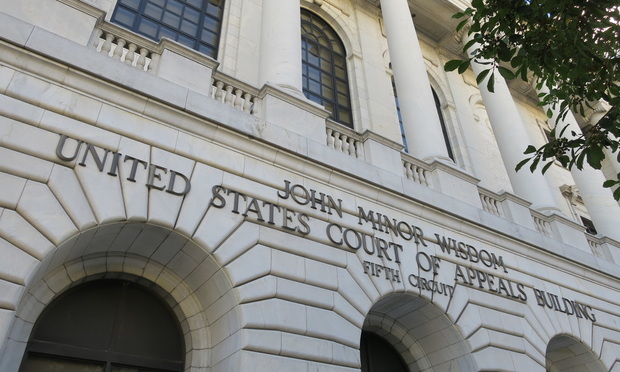Texas Appeals Court Rules Attorney Did Not Waive Arbitration by Delaying Litigation With Ex-Clients
Dallas' Fifth Court of Appeals has reversed a decision denying arbitration to a lawyer in a lawsuit brought by two ex-clients who allege the attorney…
October 02, 2018 at 05:26 PM
4 minute read
 U.S. Court of Appeals for the Fifth Circuit/photo by Michael A. Scarcella/ALM
U.S. Court of Appeals for the Fifth Circuit/photo by Michael A. Scarcella/ALM
Dallas' Fifth Court of Appeals has reversed a decision denying arbitration to a lawyer in a lawsuit brought by two ex-clients who allege the attorney waived his right to settle their fee dispute case out of court when he substantially invoked the legal process by intentionally delaying the litigation.
The decision, Camp v. Potts, involves Irving attorney William W. Camp, who was hired by Earl Potts and Diana Littlejohn to recover settlement funds owed to them. Both clients signed an engagement letter which entitled Camp to 1 percent of the collection. The engagement letter also contained a provision that stated that any dispute between the parties would be settled through arbitration.
Potts and Littlejohn later sued Camp in Dallas' 192nd District Court on Aug. 31, 2016, alleging unconscionable attorney fees and breach of contract among others for allegedly increasing his contingency fee without their consent and his refusal to disburse their settlement funds.
The former clients spent months unsuccessfully attempting to serve Camp with their lawsuit until a trial court granted substituted service on Nov. 18, 2016. Meanwhile, Camp filed a competing lawsuit against Potts and Littlejohn on Nov. 2, 2016, seeking appointment of an arbitrator and to compel arbitration in Dallas' 298th District Court.
Camp filed answer to his ex-clients' suit on Dec. 27, 2016, and requested it be consolidated with the suit in the 298th court along with a motion to compel arbitration. The judge of the 198th court put the case on a two-week nonjury trial docket for an Oct. 23, 2017, trial.
Camp filed another application for appointment of arbitrator in both the 298th and 192nd cases on Oct. 12, 2017. He later set the application hearing for Nov. 28, 2017, in the 298th case but, despite the looming trial date, did not request a similar hearing in the 192nd suit.
Potts and Littlejohn announced they were ready for the trial in the 192nd and both traveled from outside of Dallas to attend the trial but their case was not called during the two-week docket.
The 192nd court eventually entered an order consolidating both cases and Camp later filed another motion to compel arbitration. Potts and Littlejohn argued that Camp had waived his right to arbitrate by substantially invoking the judicial process to their detriment and the trial court entered an order denying Camp's arbitration motion.
Camp later appealed the decision to the Fifth Court, arguing that his arbitration agreements with his ex-clients were valid and that he did not waive arbitration by substantially invoking the legal process to Pott's and Littlejohn's detriment.
In a decision earlier this year, the Texas Supreme Court ruled that a payday lender did not waive arbitration agreements it had with customers by substantially invoking the legal process, even though it sought criminal charges against them landing some of the borrowers in jail.
And in an October 1 decision, the Fifth Court agreed with Camp's arguments that he also had not waived the arbitration agreement by substantially invoking the legal process by allegedly delaying the litigation.
“To be sure, we do not condone the delays in both the 192nd and 298th suits. These cases should have been consolidated (on motion of either party), and Camp should have set a hearing on and obtained resolution of his motion to compel arbitration, much sooner,” wrote Justice Ada Brown.
“However, given the totality of the circumstances and the strong presumption against waiver, we conclude Potts and Littlejohn did not establish they were prejudiced by Camp's delay. In the absence of evidence of prejudice, we need not address whether Camp's conduct substantially invoked the judicial process,” Brown wrote.
Camp said he was pleased with the Fifth Court's decision.
“In the underlying case, it was about trying to get money back from a defendant to acquire the funds. We felt like we did a good job for them,” Camp said. “The great thing about arbitration is it works quickly and will hopefully get this resolved. There are good people all around on this thing.''
Sheppard Sands, a Dallas attorney who represents Potts and Littlejohn, did not return a call for comment.
This content has been archived. It is available through our partners, LexisNexis® and Bloomberg Law.
To view this content, please continue to their sites.
Not a Lexis Subscriber?
Subscribe Now
Not a Bloomberg Law Subscriber?
Subscribe Now
NOT FOR REPRINT
© 2025 ALM Global, LLC, All Rights Reserved. Request academic re-use from www.copyright.com. All other uses, submit a request to [email protected]. For more information visit Asset & Logo Licensing.
You Might Like
View All

Crypto Entrepreneur Claims Justice Department’s Software Crackdown Violates US Constitution
4 minute read
Vinson & Elkins Expands Environmental Team with Chair of Texas Commission on Environmental Quality
4 minute read
Supreme Court Appears Sympathetic to Law Requiring Porn Sites to Verify Users' Age
Trending Stories
- 1'A Death Sentence for TikTok'?: Litigators and Experts Weigh Impact of Potential Ban on Creators and Data Privacy
- 2Bribery Case Against Former Lt. Gov. Brian Benjamin Is Dropped
- 3‘Extremely Disturbing’: AI Firms Face Class Action by ‘Taskers’ Exposed to Traumatic Content
- 4State Appeals Court Revives BraunHagey Lawsuit Alleging $4.2M Unlawful Wire to China
- 5Invoking Trump, AG Bonta Reminds Lawyers of Duties to Noncitizens in Plea Dealing
Who Got The Work
J. Brugh Lower of Gibbons has entered an appearance for industrial equipment supplier Devco Corporation in a pending trademark infringement lawsuit. The suit, accusing the defendant of selling knock-off Graco products, was filed Dec. 18 in New Jersey District Court by Rivkin Radler on behalf of Graco Inc. and Graco Minnesota. The case, assigned to U.S. District Judge Zahid N. Quraishi, is 3:24-cv-11294, Graco Inc. et al v. Devco Corporation.
Who Got The Work
Rebecca Maller-Stein and Kent A. Yalowitz of Arnold & Porter Kaye Scholer have entered their appearances for Hanaco Venture Capital and its executives, Lior Prosor and David Frankel, in a pending securities lawsuit. The action, filed on Dec. 24 in New York Southern District Court by Zell, Aron & Co. on behalf of Goldeneye Advisors, accuses the defendants of negligently and fraudulently managing the plaintiff's $1 million investment. The case, assigned to U.S. District Judge Vernon S. Broderick, is 1:24-cv-09918, Goldeneye Advisors, LLC v. Hanaco Venture Capital, Ltd. et al.
Who Got The Work
Attorneys from A&O Shearman has stepped in as defense counsel for Toronto-Dominion Bank and other defendants in a pending securities class action. The suit, filed Dec. 11 in New York Southern District Court by Bleichmar Fonti & Auld, accuses the defendants of concealing the bank's 'pervasive' deficiencies in regards to its compliance with the Bank Secrecy Act and the quality of its anti-money laundering controls. The case, assigned to U.S. District Judge Arun Subramanian, is 1:24-cv-09445, Gonzalez v. The Toronto-Dominion Bank et al.
Who Got The Work
Crown Castle International, a Pennsylvania company providing shared communications infrastructure, has turned to Luke D. Wolf of Gordon Rees Scully Mansukhani to fend off a pending breach-of-contract lawsuit. The court action, filed Nov. 25 in Michigan Eastern District Court by Hooper Hathaway PC on behalf of The Town Residences LLC, accuses Crown Castle of failing to transfer approximately $30,000 in utility payments from T-Mobile in breach of a roof-top lease and assignment agreement. The case, assigned to U.S. District Judge Susan K. Declercq, is 2:24-cv-13131, The Town Residences LLC v. T-Mobile US, Inc. et al.
Who Got The Work
Wilfred P. Coronato and Daniel M. Schwartz of McCarter & English have stepped in as defense counsel to Electrolux Home Products Inc. in a pending product liability lawsuit. The court action, filed Nov. 26 in New York Eastern District Court by Poulos Lopiccolo PC and Nagel Rice LLP on behalf of David Stern, alleges that the defendant's refrigerators’ drawers and shelving repeatedly break and fall apart within months after purchase. The case, assigned to U.S. District Judge Joan M. Azrack, is 2:24-cv-08204, Stern v. Electrolux Home Products, Inc.
Featured Firms
Law Offices of Gary Martin Hays & Associates, P.C.
(470) 294-1674
Law Offices of Mark E. Salomone
(857) 444-6468
Smith & Hassler
(713) 739-1250






